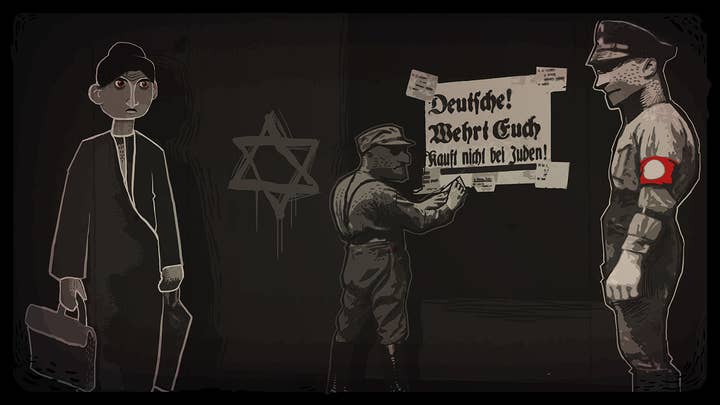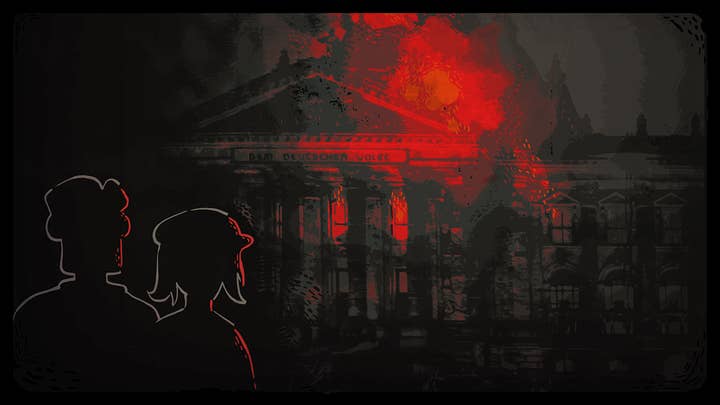How games whitewash Nazism, and the responsibility developers have to history
Through the Darkest of Times devs explore the industry's dangerous failure when it comes to depicting fascism
The imagery of a blood-drenched superhuman single handedly carving his way through hordes of faceless bad guys is one that is so familiar to games.
Whether it's the ordinary man in extraordinary circumstances or the augmented space marine blowing up entire planets, the lonesome hero archetype who solves every problem with violence owes a certain amount of its heritage to Nazi propaganda.
Paintbucket Games is a Berlin-based indie currently developing Through the Darkest of Times, a strategy game set in Germany during the Second World War which sees players take the role of resistance group fighting against the Nazi regime.
Speaking during the Ludicious Game Festival in Zürich last month, studio co-founders Sebastian Schulz and Jörg Friedrich explored how games depict Nazis wrong, and why it should concern us.
As Schulz argued, modern games effectively replicate the fascist aesthetic of the Übermensch -- the man beyond men.
This is problematic in a few ways, he argued, but specifically how the proliferation of Übermensch literature glamorised the frontline experience of First World War soldiers, and accompanied the decline and eventual outlawing of a burgeoning new wave of post-war expressionism in Germany during the 1920s and 1930s.
"Part of what dominates mainstream video games aesthetics inherits the authoritarian and fascist idea of the Übermensch"
Sebastian Schulz, art director
During the Nazis' slow rise to power in Germany throughout those years, the new forms of artistic expression which blossomed from trauma of losing the war were deemed "un-German", and sparked a complete rollback to a pre-war imperialist fantasy remincienet of Greek and Roman historicism in writing, art, and architecture.
"All over the media, Germans were portrayed as white, heroic super humans while Jewish, Polish, Russian and Slavic people were defamed as Untermensch [inferior people]," said Schulz. "And one of the most popular forms of literature at the time was the front line experience -- war as a spiritual experience, and books with titles like Storm of Steel, Fire and Blood, Werewolf tell the stories of the brave, heroic soldier.
"Often, video game narratives with white male heroes use a very similar method: the lonesome soldier who has to make tough decisions and solve all problems using violence. And even Wolfenstein which does a lot of things right, by telling about the Nazis' anti-semitism and holocaust, celebrates aesthetics of fascism as invented by [Nazi-sympathising artists]... Part of what dominates mainstream video games aesthetics inherits the authoritarian and fascist idea of the Übermensch ."
Of course, the lonesome hero is not a trope entirely owned by Nazism, but it was propagated during Hitler's regime to the exclusion of almost all other artistic expression. That unshakable display of power and superiority is an aesthetic adopted wholesale by modern game development, and rarely challenged outside of the indie scene.
However, the problem actually runs much deeper than a simple aesthetic similarity, as noted by Friedrich, who outlined the ways in which games whitewash historical fascism.

While Friedrich said he didn't want to blame other games for their portrayal of Nazism, he did say that the industry should be treating the topic better.
"In many games Nazism is reduced to World War II," he said. "In most games, the Third Reich begins with D-Day, and the landing of Allied troops in Normandy in 1944, and it ends one year later with the invasion of Berlin, which is rather short.
"When you look at D-Day, it's basically everywhere. From the first Medal of Honor in 1999, to the latest Call of Duty: WWII, you can fight this battle over and over again in video games. And the way Nazis are displayed in this combat is a good example of what's wrong in the way we show Nazis.
"Because all they are there is just another enemy -- they're the guys on the other side of the guns. They are just some foes that make your crosshair go red."
Friedrich argued this is an oversimplification of Nazism that fails to address not only the regime's insidious rise to power, but the horrors inflicted outside of the Western front, by the Nazis both at home and in Eastern Europe. Furthermore, because of the impetus for modern games to allow online multiplayer, developers foster the "clean Wehrmacht" trope -- the regular German soldier or officer who "knew nothing and just fulfilled his duty".
"The trope of the 'clean Wehrmacht' wasn't invented by the games industry," said Friedrich. "It was widespread also in Germany until the very late 1980s, and that is no surprise given the fact that most German men born before 1930 were part of the Wehrmacht in one way or another. So there was not a big interest in finding out about the war crimes committed by the Wehrmacht... That the Wehrmacht took an important part in Hitler's [genocide] is a historical fact that is only denied by neo-Nazis and revisionists.
"Not only are games not telling the full story, by doing so they also allow neo-Nazi groups to recruit and grow around gaming communities"
Jörg Friedrich, lead designer
"So to justify the option of letting people play as the Germans in World War II, some games bring back the myth of the clean Wehrmacht and the Wehrmacht as just another army."
While arguments that "it's just a game" will always fly in these debates, Friedrich highlighted the issue that games -- along with other pieces of mass media -- play a role in defining our cultural understanding of the past.
"Nazis, if you learn everything about them from video games, are always at war," he said. "They are always wearing uniforms, they are always carrying weapons, they are always invading some country -- that's how you detect them.
"While in fact, Nazis rose to power very slowly and using mechanism that weren't just weapons and uniforms; they destroyed democratic mechanisms like checks and balances, the freedom of press, or unions... long before the first bullet was fired."
Friedrich argued that games could and should be part of the commemoration of history, but the ways in which Nazism is frequently sanitised is a disservice to history. Call of Duty: WWII for example was criticised for it its "gutless" portrayal of the Holocaust, which saw the Nazis kill over six million Jews, and millions of Eastern Europeans.
"Not only are games not telling the full story, by doing so they also allow neo-Nazi groups to recruit and grow around gaming communities," said Friedrich. "World War II is the event which traumatised generations, that fundamentally broke the taboos of civilisation... While games are certainly not only responsible for these numbers,they currently do too little to help them either.
"Internet and gaming culture have become fruitful ground for neo-Nazi and fascist movements. They love to play and recruit around games. They enjoy the fascist aesthetic these games provide, and because they do not challenge their views on the world, they can still happily deny the Holocaust and play historical games."
The pair closed out their talk with a call for developers to better understand their responsibility when tackling historical topics of such social importance.
"We should not avoid controversy and at the same time whitewash World War II and war crimes," said Friedrich. "Games can and should be an important part of commemoration."
GamesIndustry.biz attended the Ludicious Game Festival with help from the organiser.

